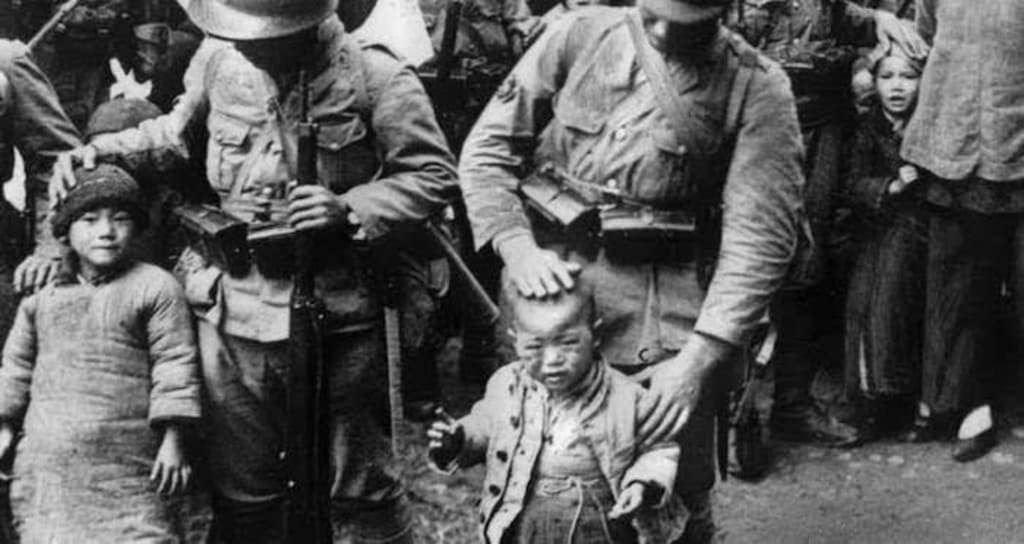Atrocities committed by Japan during the second World War
During World War II, Japan committed a number of atrocities and war crimes, both in Asia and the Pacific, which caused immense suffering and loss of life.

During World War II, Japan committed a number of atrocities and war crimes, both in Asia and the Pacific, which caused immense suffering and loss of life. Some of the most well-known atrocities committed by Japan during this time include:
Nanking Massacre (Rape of Nanking):
The Nanking Massacre occurred when Japanese forces captured the Chinese city of Nanking (Nanjing) in December 1937 during the Second Sino-Japanese War. Over a period of several weeks, Japanese soldiers engaged in widespread acts of violence, including mass killings, rapes, looting, and arson. Civilians and disarmed Chinese soldiers were subjected to extreme brutality. Many women were raped, and countless civilians were murdered, often in very gruesome ways. The exact death toll remains a subject of debate, but estimates range from tens of thousands to over 300,000 victims.
Unit 731:
Unit 731 was a secret Japanese military unit responsible for conducting horrific experiments on human subjects in an effort to develop biological and chemical weapons. Prisoners, mainly Chinese and Korean, were subjected to a wide range of inhumane experiments, including exposure to diseases like plague and anthrax, frostbite testing, and vivisections without anesthesia. These experiments led to the agonizing deaths of thousands of individuals and left lasting physical and psychological scars on survivors.
Comfort Women:
The comfort women system involved the forced recruitment and coercion of women from various Asian countries into sexual slavery for Japanese soldiers during WWII. These women were often deceived or abducted under false pretenses and subjected to rape, physical abuse, and dehumanizing conditions in military brothels. Many of these women faced lifelong trauma and shame as a result of their experiences. Despite evidence and testimonies, there has been ongoing denial and controversy surrounding this issue from some segments of Japanese society.
Bataan Death March:
Following the Battle of Bataan in the Philippines, Japanese forces forced around 75,000 Filipino and American prisoners of war to march around 65 miles from Bataan to Camp O'Donnell. The march lasted for several days and subjected the prisoners to extreme heat, physical abuse, and lack of food and water. Many prisoners died from exhaustion, dehydration, and brutality during the march.
Forced Labor:
Japan forced millions of people from occupied territories into forced labor, often under dire conditions. Workers were subjected to long hours, inadequate food, poor shelter, and physical abuse. Many were worked to the point of exhaustion, and the mortality rate among forced laborers was high. Koreans were heavily exploited for labor, particularly in mines and heavy industries, during Japan's occupation of Korea.
Biological Warfare in China:
Japanese forces engaged in biological warfare experiments in China, releasing disease-infected insects and other vectors to spread diseases like plague and cholera. These experiments led to outbreaks of these diseases among civilian populations, causing immense suffering and death.
Execution of Allied POWs:
Japanese forces violated the rules of war by mistreating and executing Allied prisoners of war. In some cases, prisoners were subjected to forced labor, medical experiments, and brutal treatment. One infamous incident is the Bataan Death March mentioned earlier, but there were other instances of mistreatment and execution of POWs in various locations.
In conclusion, the atrocities committed by Japan during World War II cast a dark and indelible shadow on the pages of history. From the harrowing Nanking Massacre, where unspeakable acts of violence and cruelty were inflicted upon innocent civilians, to the abhorrent experiments of Unit 731 that pushed the boundaries of human suffering, these events are a chilling testament to the depths of human depravity during times of conflict.
The plight of comfort women, forcibly subjected to sexual slavery, serves as a stark reminder of the systematic dehumanization that can arise in the pursuit of power. The Bataan Death March and the exploitation of forced labor underscore the disregard for human dignity in the face of strategic interests. The use of biological warfare and the mistreatment of Allied POWs further emphasize the erosion of ethical boundaries that can occur in war's midst.
The memory of these atrocities evokes not only the immense pain endured by victims but also serves as a collective call to prevent history from repeating itself. Acknowledgment, accountability, and commemoration are essential steps in healing the wounds of the past. By studying these dark chapters, we gain insight into the darkest corners of humanity, emphasizing the urgency of nurturing compassion, understanding, and diplomacy.
These events also remind us of the significance of international cooperation and institutions that strive to prevent future atrocities. As the world grapples with conflicts and challenges, the lessons of history remind us that our shared responsibility is to foster a world where atrocities have no place. In our pursuit of a better future, we honor the victims by ensuring that the horrors they endured remain etched in our collective memory—a poignant reminder of the human cost of unchecked aggression and intolerance.
About the Creator
Dharmendra Bonomaully
Hello I am Dharmendra Bonomaully from the lovely island of Mauritius. I am a writer and book reviewer. I have been an avid reader since childhood. I am fluent in both English and French language.






Comments
There are no comments for this story
Be the first to respond and start the conversation.